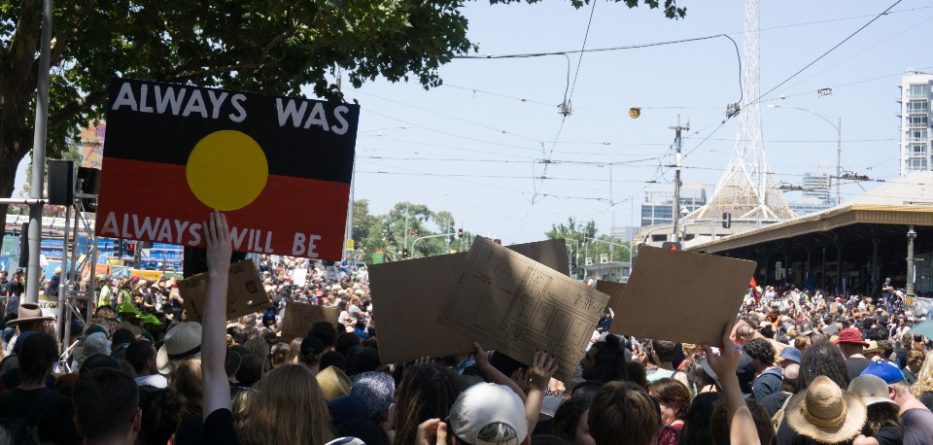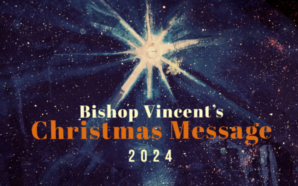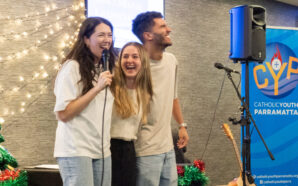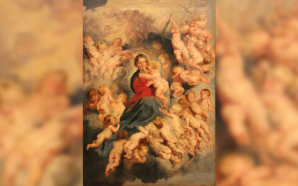Homily for the 32nd Sunday in Ordinary Time Year C
Maccabees 7:1-2,9-14; Psalm 16; 2 Thessalonians 2:16-3:5; Luke 20:27-38
6 November 2022
In today’s psalm, we pray:
Lord, hear a cause that is just,
pay heed to my cry.
Turn your ear to my prayer:
no deceit is on my lips.
And in the second reading, we hear Paul greeting the Thessalonians with these words: ‘May our Lord Jesus Christ himself, and God our Father who has given us his love and, through his grace, such inexhaustible comfort and such sure hope, comfort you and strengthen you in everything good that you do or say’. We Christians who live in robust pluralist democracies like Australia accept that some of the good things we do and say are political, and that not everyone, even including our fellow Christians, necessarily agrees with our political stands.
Listen at https://soundcloud.com/frank-brennan-6/homily-61122
During the first year of his pontificate, Pope Francis in his Apostolic Exhortation Evangelii Gaudium said:[1]
‘An authentic faith – which is never comfortable or completely personal – always involves a deep desire to change the world, to transmit values, to leave this earth somehow better that we found it. We love this magnificent planet on which God has put us, and we love the human family which dwells here, with all its tragedies and struggles, its hopes and aspirations, its strengths and weaknesses. The earth is our common home and all of us are brothers and sisters.’
Pope Francis then quoted with approval his predecessor Pope Benedict who wrote in his encyclical Deus Caritas Est that ‘the just ordering of society and of the state is a central responsibility of politics’, and that the Church ‘cannot and must not remain on the sidelines in the fight for justice’.[2]
Pope Francis added this observation: ‘All Christians, their pastors included, are called to show concern for the building of a better world. This is essential, for the Church’s social thought is primarily positive: it offers proposals, it works for change and in this sense it constantly points to the hope born of the loving heart of Jesus Christ.’
The recently completed Plenary Council of our Church endorsed the Uluru Statement from the Heart and encouraged ‘engagement with processes for implementing the statement, including local, regional, and national truth-telling efforts.’[3]
Prior to the 2007 election, John Howard promised an amendment to the Australian Constitution providing recognition of Aborigines and Torres Strait Islanders in a preamble to the Constitution. In turn, the new Rudd Labor government committed itself to consultation on the matter with Indigenous Australians. Julia Gillard then set up an Expert Panel which recommended something more substantive than a symbolic preamble. The panel wanted a racial non-discrimination clause placed in the Constitution. Critics saw this as a one-line ‘bill of rights’. There was no way this proposal could win support in the Parliament. After a round of community consultations, Aboriginal and Torres Strait Islander representatives gathered at Uluru for the 50th anniversary of the 1967 referendum, and called for ‘the establishment of a First Nations Voice enshrined in the Constitution[4].
Liberal Prime Ministers Tony Abbott, Malcolm Turnbull and Scott Morrison ruled out any such proposal. The Albanese government was elected with a commitment to proceed with a referendum. At the Garma Festival in July, Prime Minister Anthony Albanese proposed this formula of words:
- There shall be a body, to be called the Aboriginal and Torres Strait Islander Voice.
- The Aboriginal and Torres Strait Islander Voice may make representations to Parliament and the Executive Government on matters relating to Aboriginal and Torres Strait Islander Peoples.
- The Parliament shall, subject to this Constitution, have power to make laws with respect to the composition, functions, powers and procedures of the Aboriginal and Torres Strait Islander Voice.[5]
Noel Pearson in his first Boyer Lecture has said, ‘We know the nation’s leader must be joined by all his counterparties in the federal parliament’.[6] For any referendum to succeed, there is a need for a parliamentary process inviting all persons to put forward their proposed wording of any amendment. There will then be a need for buy-in and ownership of any proposal from both sides of the parliamentary aisle. That is now the task before us. Noel Pearson is confident that ‘racism will diminish in this country when we succeed with recognition’[7]. The challenge is to find a formula of words for that constitutional recognition acceptable both to Indigenous leaders and to our national leaders on both sides of the parliamentary chamber.
Presumably, this is a cause which is just. In pursuing it, there should be no deceit on our lips. The going will be tough. But we are assured inexhaustible comfort and sure hope in everything good that we do or say. Having said that, we need to concede that there will be people of goodwill, including some committed Christians who oppose whatever is ultimately proposed for insertion into our Constitution.
I suggest ten steps for Australian Christians inspired by our Catholic social teaching when approaching the forthcoming referendum. I couch the suggestions in terms appropriate for those of us who are not Indigenous.
- Be attentive to the voices of Aboriginal and Torres Strait Islander peoples. Stop telling them what is good for them. Start listening to them. Accept that they know what is good for them, just as we know what is good for us and our loved ones.
- Don’t expect all Aboriginal and Torres Strait Islanders to agree about legal, political and constitutional questions. It’s called living in a democracy.
- Form respectful relationships with Aboriginal and Torres Strait Islander peoples and engage in respectful conversations with those who are your friends.
- Having heard a range of Indigenous voices, make your own decisions about what Aboriginal aspirations are morally justified. What would be right and proper for Australia in the 21st century? For example, the Commonwealth Parliament has power to make special laws about us First Nations people. Many Aboriginal people now say, ‘No special laws without us!’
- Know your history; know the Aboriginal history. The Australian Constitution does not even mention Aborigines or Torres Strait Islanders. They belong in the Constitution. Their belonging should be explicit and particular.
- The Constitution belongs to all the people. It cannot be amended except with an overwhelming majority of the people. Educate yourselves about the Aboriginal aspirations at Uluru and be ready to discuss those aspirations at the family meal or the workplace BBQ.
- Do something to get this issue of constitutional recognition on the right track. Speak to your local member. Ask that the parliament set up a process so everyone can have their say and so that the major political parties can own whatever is proposed. This is not just a matter for Indigenous leaders. It is not just a matter for the government. It involves all of us.
- Having decided which Aboriginal aspirations are morally justified, you then need to make a wise decision about which of those aspirations are politically achievable. Don’t be afraid to talk to people with varying views when making that decision.
- Having decided which Aboriginal aspirations are morally justified and politically achievable, you then need to decide to act. You need to put some skin in the game. You need to decide what you will actually do about it. It’s not enough just to vote when the referendum comes around. You need to get on board urging the parliament to put the right proposition to the vote, and helping your fellow citizens make an informed choice.
- Be respectful and attentive to those who disagree with you, but don’t be afraid to demand that they be respectful and attentive to you. We know that any national Voice worth its salt will have an elaborate system of local and regional ears to hear the local and regional voices which are needed to give credibility to any national voice. That will be complex. There will be plenty of room for disagreement.
Whatever the politics of this referendum, let’s take to heart Noel Pearson’s chilling observation about his people: ‘We are a much-unloved people. We are perhaps the ethnic group Australians feel least connected to. We are not popular and we are not personally known to many Australians. Few have met us and a small minority count us as friends.’[8]
Let us pray:
Lord, hear a cause that is just,
pay heed to my cry.
Turn your ear to my prayer:
no deceit is on my lips.
Guard me as the apple of your eye.
Hide me in the shadow of your wings.
Lord Jesus Christ, comfort us and strengthen us in everything good that we do and say.
Fr Frank Brennan SJ is the Rector of Newman College, Melbourne, and the former CEO of Catholic Social Services Australia (CSSA). He was appointed a peritus at the Fifth Plenary Council of the Australian Catholic Church.
[1] Pope Francis, Evangelii Gaudium, #183
[2] Benedict XVI, Deus Caritas Est #28
[3] Fifth Plenary Council of Australia, Draft Decree One, Reconciliation: Healing Wounds, Receiving Gifts available at https://plenarycouncil.catholic.org.au/wp-content/uploads/2022/07/FINAL-Decree-1-Reconciliation-Healing-Wounds-Receiving-Gifts.pdf
[4] Uluru Statement from the Heart, available at https://ulurustatemdev.wpengine.com/wp-content/uploads/2022/01/UluruStatementfromtheHeartPLAINTEXT.pdf
[5] Anthony Albanese, Address to Garma Festival, 30 July 2022 available at https://www.pm.gov.au/media/address-garma-festival
[6]Noel Pearson, Boyer Lecture 1: Recognition, available at https://about.abc.net.au/speeches/noel-pearson-boyer-lecture-series-who-we-were-and-who-we-can-be/
[7] Ibid.
[8] Ibid.








